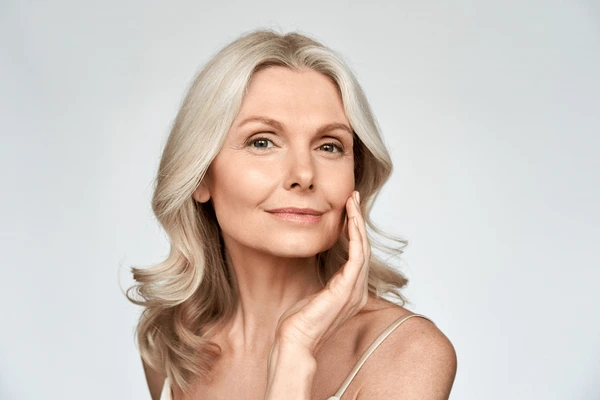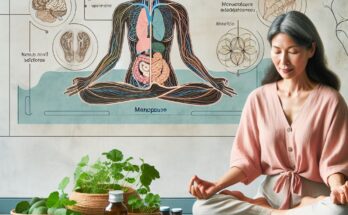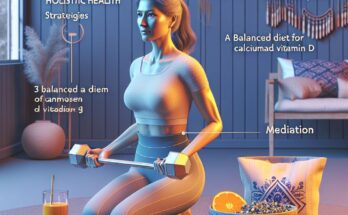Explore the holistic perspective on maintaining hair health post-menopause. In this guide, we uncover natural solutions and strategies to nurture your locks during this transformative phase of life. From nourishing treatments to lifestyle adjustments, discover how to embrace your hair’s vitality and radiance holistically. Dive into our expert insights and practical tips to achieve healthy, vibrant hair beyond menopause.
Key Takeaways
- Hormonal changes during menopause can lead to hair thinning and changes in hair health.
- A nutrient-rich diet, especially with proteins and antioxidants, can strengthen hair from within.
- Gentle hair care practices are essential to prevent further damage to postmenopausal hair.
- Stress management plays a crucial role in maintaining healthy hair.
- Topical treatments and hormone therapy may offer solutions for hair regrowth.
Cultivating Hair Resilience in Postmenopausal Life
When we step into the postmenopausal chapter of our lives, our hair often tells a story of change. As the luster and fullness of our locks may wane, it’s not just a cosmetic issue—it’s a signal from our bodies that they need a little extra TLC. Here, I’ll walk you through nurturing your hair with a holistic approach that not only addresses the external symptoms but also supports your overall well-being.
The Vital Connection: Hormones and Hair Health
Let’s talk about hormones. They’re like the music conductors of our bodies, setting the tempo for growth, mood, and yes, hair health. During menopause, estrogen levels take a bow and exit the stage, leaving our hair to face the music without its usual support. This drop in estrogen can lead to hair thinning, but don’t fret—there are harmonious solutions to keep your hair’s performance pitch-perfect.
Nutritional Building Blocks for Thick Tresses
Nourishing your body from the inside out is a cornerstone of hair vitality post-menopause. Your hair craves building blocks like protein and vitamins to stay strong and resilient. Imagine your hair as a plant; just as a plant needs good soil to thrive, your hair needs a nutrient-rich environment to grow.
Protein Power: Strengthen Your Strands from Within
Protein is the main component of hair, so when your diet is rich in high-quality protein, you’re literally feeding your hair. Lean meats, beans, nuts, and seeds are excellent sources. Remember, strong strands start with the sustenance you provide.
Antioxidants and Vitamins: Ward off Hair Aging
Antioxidants are your hair’s personal bodyguards against aging. They fight off the environmental stressors that can make your hair look tired. Foods rich in antioxidants—like berries, leafy greens, and nuts—are not just good for your body; they’re a shield for your hair. Vitamins, especially A, C, and E, join the fray, keeping your hair armored against damage.
Most importantly, a holistic approach isn’t just about what you eat; it’s also about how you treat your hair on the outside.
Gentle Rituals for Daily Hair Care
Imagine your hair as delicate silk. You wouldn’t scrub or wring it out; you’d handle it with care. That’s exactly how you should treat your hair post-menopause.
Comb with Care: Protecting Fragile Fibers
Use a wide-toothed comb or a brush with natural bristles to gently detangle your hair, working from the ends up to prevent breakage. Wet hair is especially vulnerable, so be extra gentle after a shower.
Next, we’ll dive into how the simple act of managing stress can have a profound impact on your hair’s health.
The Role of Stress Reduction in Hair Vitality
Stress isn’t just a feeling; it’s a physical response that can directly impact your hair. When you’re stressed, your body produces hormones that can lead to hair thinning. But there’s good news: by managing stress, you can help your hair stay as full and vibrant as possible.
Mindfulness Matters: Calming the Cascade of Hair Harm
Practicing mindfulness can be a powerful tool in your hair care arsenal. It’s about being present in the moment and reducing the stress that can send your hair into a shedding frenzy. Mindfulness can be as simple as deep breathing exercises, meditation, or even a leisurely walk in nature. These practices help lower stress hormones, creating a more hair-friendly environment in your body.
Besides that, did you know that even the way you think about stress can change the way it affects your body? A positive outlook can actually diminish the negative impact stress has on your hair. So, embrace challenges as opportunities to grow, and your hair might just follow suit.
Therefore, let’s not forget about the physical aspect of stress reduction. Exercise is a key player in the health of your hair.
Physical Activity: Boost Flow to Fortify Follicles
Exercise isn’t just great for your heart; it’s also great for your hair. Physical activity boosts circulation, which means more oxygen and nutrients get to your scalp and hair follicles. This can lead to stronger, healthier hair growth. So, lace up those sneakers and get moving for your mane’s sake!
Advanced Treatments and Therapies
If you’re looking for more targeted solutions, there are advanced treatments and therapies that can help with hair regrowth post-menopause.
Topical Triumphs: Minoxidil and More
Topical treatments, like Minoxidil, have been proven to help some women with hair regrowth. It works by stimulating the hair follicles and extending the growth phase of the hair cycle. Consistency is key, though. It’s not a one-time fix but a part of your daily routine.
But remember, these treatments can take time to show results. Patience and persistence are your friends here.
Hormone Therapy: Is it the Right Mane Move?
Hormone replacement therapy (HRT) can also be an option for some women. It works by replenishing some of the estrogen that’s lost during menopause, which can help with various symptoms, including hair thinning. However, it’s essential to weigh the benefits against the risks and discuss this with your healthcare provider.
A No-Fret Finale: Hair Health Optimism
It’s easy to get caught up in the worries of hair changes post-menopause, but adopting a positive outlook can make a world of difference. Embrace the changes and focus on the steps you can take to maintain the health and beauty of your hair.
Embracing Change: Hair Positivity Post-Menopause
Change is a natural part of life, and your hair is no exception. Celebrate the wisdom and experience that come with age and let that confidence shine through. Your attitude can have a profound effect on how you perceive yourself and how others perceive you.
Nurturing Growth: Long-Term Care Strategies
Finally, think of your hair care as a long-term investment in yourself. Just like any other aspect of health, it requires attention and care. Stay committed to your nutritional, stress-reduction, and hair care strategies, and you’ll be setting the stage for healthy hair for years to come.
Frequently Asked Questions
What Causes Hair Thinning After Menopause?
Hair thinning after menopause is primarily caused by hormonal changes. As estrogen levels decrease, hair can become thinner and may not grow as quickly. But with the right care and attention, you can mitigate these effects.
Can Diet Really Improve Hair Health?
Absolutely. A diet rich in proteins, antioxidants, and vitamins provides the nutrients your hair needs to be strong and healthy. It’s one of the most important steps you can take for your hair health.
Are There Specific Hair Care Products Recommended for Postmenopausal Hair?
Yes, products that are gentle and designed to strengthen and nourish thinning hair can be beneficial. Look for items that are free of harsh chemicals and sulfates. And remember, a little goes a long way.
How does Stress Affect Hair Health?
Stress can lead to hormonal imbalances that may cause hair to enter the shedding phase more quickly. Managing stress through mindfulness and physical activity can help maintain a healthy hair cycle.
What is Minoxidil and How Does it Help?
Minoxidil is a topical treatment that’s applied to the scalp to help stimulate hair growth. It’s one of the few treatments that’s been approved by the FDA for hair loss in women.
Should I Consider Hormone Therapy for Hair Regrowth?
Hormone therapy may be an option for some women, but it’s important to discuss the potential benefits and risks with your healthcare provider.
How Can I Embrace My Changing Hair Positively?
By focusing on what you can control—like your diet, stress levels, and hair care routine—you can maintain a positive outlook. Celebrate the unique beauty of your hair at every stage of life.
Nurturing Growth: Long-Term Care Strategies
Long-term care for your hair involves a commitment to nurturing practices. It means being gentle with your hair, avoiding over-styling, and protecting it from the elements. It’s about being consistent with your diet and stress management techniques. By doing so, you’re not just maintaining the health of your hair, you’re investing in your overall well-being.
Frequently Asked Questions
In this section, I’ll answer some of the most common questions about hair health after menopause. These answers will provide you with a quick reference guide to the topics we’ve covered.
What Causes Hair Thinning After Menopause?
Hair thinning after menopause is often the result of hormonal changes. Lower levels of estrogen can affect the hair growth cycle, leading to thinner hair and a slower growth rate. But with the right approach, you can combat these effects and encourage healthier hair.
It’s also important to consider other factors like nutrition, stress, and hair care practices, as they all play a part in hair health.
Can Diet Really Improve Hair Health?
Indeed, diet can have a significant impact on hair health. Hair is made of protein, so ensuring you have enough protein in your diet is essential. Vitamins and minerals, particularly iron, vitamins A, C, E, and B vitamins, are also crucial for healthy hair growth. A balanced diet rich in these nutrients can help your hair stay strong and lustrous.
Are There Specific Hair Care Products Recommended for Postmenopausal Hair?
Yes, there are products that can help. Look for shampoos and conditioners that are hydrating and designed for thinning hair. Products with ingredients like biotin or keratin can also be beneficial. Avoid harsh chemicals and treatments that can damage your hair and scalp.
Here’s a quick comparison of what to look for and what to avoid:
| Look For | Avoid |
|---|---|
| Hydrating ingredients | Alcohol-based products |
| Natural oils and butters | Sulfates and parabens |
| Proteins like biotin and keratin | Excessive heat styling |
| Gentle, sulfate-free cleansers | Harsh chemical treatments |
How does Stress Affect Hair Health?
Stress can have a direct impact on your hair. It can cause your hair to enter the shedding phase more rapidly and can even affect the health of your scalp. By managing stress through techniques like meditation, exercise, and proper rest, you can help your hair maintain its natural growth cycle.
What is Minoxidil and How Does it Help?
Minoxidil is a topical medication that’s used to treat hair thinning and loss. It works by stimulating the hair follicles and extending the growth phase of the hair cycle. While it’s not a cure-all, it has helped many individuals improve their hair density and strength over time.
Should I Consider Hormone Therapy for Hair Regrowth?
Hormone therapy can be an option for some women experiencing hair thinning after menopause. It may help to rebalance hormone levels and improve hair growth. However, it’s crucial to discuss this with your healthcare provider to understand the potential benefits and risks.
How Can I Embrace My Changing Hair Positively?
Embracing your changing hair starts with acceptance and understanding that it’s a natural part of aging. Focus on the things you can control, like your diet, stress levels, and hair care routine. Celebrate the unique beauty of your hair at every stage, and let your confidence shine.
Remember, while the physical aspects of hair care are important, your attitude towards these changes plays a significant role as well. Embrace the journey, and let your hair be a reflection of the vibrant life you continue to lead.



